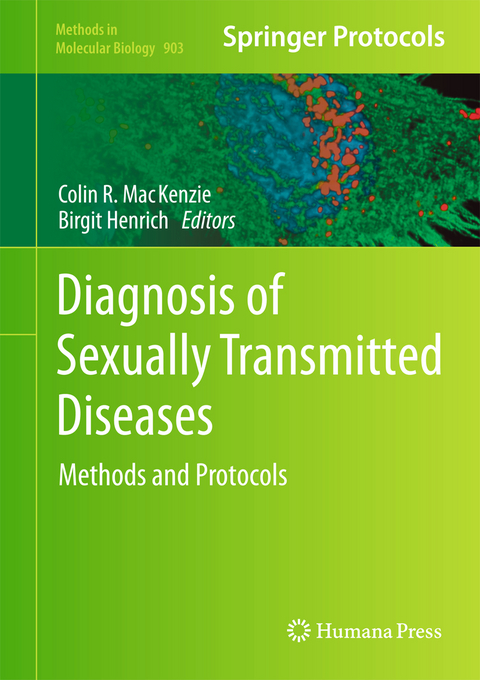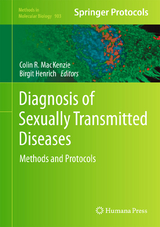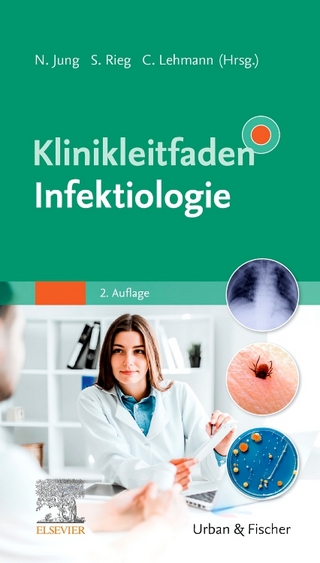Diagnosis of Sexually Transmitted Diseases
Humana Press Inc. (Verlag)
978-1-61779-936-5 (ISBN)
Sexually transmitted infections (STI) continue to be a major cause of morbidity and mortality, both in developed industrial countries as well as in the developing world. Human immunodeficiency virus infections and the ensuing opportunistic infections are a major drain on the human and financial resources of many countries in the developing world and even with the availability of effective treatment the epidemic is not yet contained. Screening in developing worlds is difficult and there is a need for simple reliable cheap diagnostic methods that can be performed at the point of care, on the same day and by staff with limited training. Molecular biological methods are very attractive for the diagnosis of STI since a well defined range of pathogens is responsible for the infection. Diagnosis of Sexually Transmitted Diseases: Methods and Protocols strives to cover the full range of molecular testing for STI. Chapters cover a variety of topics such as aspects of DNA extraction from small volume samples or difficult tissues, simple, nested or multiplex PCR, use of duplex primers or other modifications of primers and PCR conditions, sequence analysis for genotyping, denaturing gel analysis, microarrays using liquid beads or microspheres and silicon nanoparticle-enhanced microcantilever detection of DNA. Written in the successful Methods in Molecular Biology™ series format, chapters include introductions to their respective topics, lists of the necessary materials and reagents, step-by-step, readily reproducible protocols, and notes on troubleshooting and avoiding known pitfalls.
Authoritative and easily accessible, Diagnosis of Sexually Transmitted Diseases: Methods and Protocols will be a valuable reference for the scientist looking to establish molecular methodologies for the diagnosis of STI tests intheir own lab.
Overview of Molecular Biological Methods for the Detection of Pathogens Causing Sexually Transmitted Infections.- Guidelines for the Qualitative Detection of Viral Genomes in Dried Blood Spots.- Guidelines for the Quantification of HIV and HCV in Small Volume Whole Blood Samples.- Guidelines for High-Resolution Genotyping of Chlamydia trachomatis Using Multilocus Sequence Analysis.- Guidelines for the Use of Molecular Tests for the Detection and Genotyping of Human Papilloma Virus from Clinical Specimens.- The Molecular Diagnosis of Sexually Transmitted Genital Ulcer Disease.- Validation of a Sensitive and Specific Real-Time PCR for Detection and Quantitation of Hepatitis B Virus Covalently Closed Circular DNA in Plasma of Chronic Hepatitis B Patients.- Protocol for the Detection of Mycoplasma genitalium by PCR from Clinical Specimens and Subsequent Detection of Macrolide Resistance Mediating Mutations in Region V of the 23S rRNA Gene.- Protocols for Detection and Typing of Treponema pallidum Using PCR Methods.- Protocol for the Extraction of DNA from Dried Blood in the Diagnosis of Convenital CMV Infection.- Protocol for the Use of PCR-Denaturing Gradient Gel Electrophoresis and Quantitative PCR to Determine Vaginal Microflora Constitution and Pathogens in Bacterial Vaginosis.- Protocol for the Use of a Bead Array for the Multiple Detection of Genotype of Chlamydia trachomatis.- Protocol for the Detection and Genotyping of Human Papilloma viruses Using a Liquid Bead Microarray Assay (LBMA).- Protocol for the Use of Enzyme-Linked Hybridisation Assays for Genital Ulcer Disease.- Protocol for the Rapid Detection of the Urogential Tract Mollicutes and Chlamydia with Concomitant LGV –(sub)typing.- Protocol for the Use of Self-Reporting Duplex Mutation Primers to Detect PCR Products in the Diagnosis of HBV.- Protocol for the Use of a Rapid Real-Time PCR Method for the Detection of HIV-1 Proviral DNA Using Double-Stranded Primer.- Protocol for the Use of Light Upon Extension (LUX) Real-Time PCR for the Determination of Viral Load in HBV Infection.- Protocol for the Use of a Silica Nanoparticle-Enhanced Microcantilever Sensor-Based Method to Detect HBV at Femtomolar Concentrations.- Protocol for the Detection of Treponema pallidum in Paraffin-Embedded Specimens.- Guidelines for the Use of Molecular Biological Methods to Detect Sexually Transmitted Pathogens in Cases of Suspected Sexual Abuse in Children.- Protocol for the Molecular Detection of Antibiotic Resistance Mechanisms in Neisseria gonorrhoeae.- Protocol for a Facile Multiplex PCR for Multi-Antimicrobial Resistance and Gonococcus Detection.- Protocol for Gene Expression Profiling Using DNA Microarrays in Neisseria gonorrhoeae.- Protocol for the Detection of Human Leukocyte Antigen Variants and Sexually Transmitted Infections: From Genotyping to Immunoassays.- Protocol for the Clonal Analysis of NK Cell Effector Functions by Multi-Parameter Flow Cytometry.- Protocol for a Mammalian Cell-Based Assay for Monitoring the HIV-1 Protease Activity.- Self Collection of Specimens for Nucleic Acid-Based Diagnosis of Pharyngeal, Cevicovaginal, Urethral and Rectal Neisseria gonorrhoeae and Chlamydia trachomatisInfections.- Sexually Transmitted Diseases – Reflections on Metaphors and Ethics.
| Reihe/Serie | Methods in Molecular Biology ; 903 |
|---|---|
| Zusatzinfo | XIV, 439 p. |
| Verlagsort | Totowa, NJ |
| Sprache | englisch |
| Maße | 178 x 254 mm |
| Themenwelt | Medizin / Pharmazie ► Medizinische Fachgebiete ► Mikrobiologie / Infektologie / Reisemedizin |
| Studium ► Querschnittsbereiche ► Infektiologie / Immunologie | |
| Naturwissenschaften ► Biologie ► Mikrobiologie / Immunologie | |
| Schlagworte | immunodeficiency virus infections • molecular biological methods • PCR methods • sexually transmitted disease (STD) • sexually transmitted infection (STI) |
| ISBN-10 | 1-61779-936-X / 161779936X |
| ISBN-13 | 978-1-61779-936-5 / 9781617799365 |
| Zustand | Neuware |
| Informationen gemäß Produktsicherheitsverordnung (GPSR) | |
| Haben Sie eine Frage zum Produkt? |
aus dem Bereich




